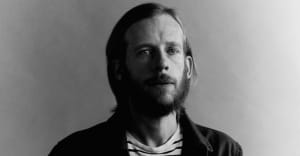
On “Wheel Well,” the delicate opening song from Bad Books’ first album in seven years, New York-born singer-songwriter Kevin Devine asks a question then answers it himself. “If the people you meet are mostly you in disguise / And want what you want, something good in their lives,” he sings, “Is that a socialist song? / An invocation of Christ, I guess / It’s whatever you like.” Barely perceptible piano notes reverse themselves in the background. Andy Hull, the lead singer of Atlanta-based indie rock band Manchester Orchestra and co-lead singer of Bad Books, whispers harmonies behind him.
The question covers the breadth of Bad Books’ stop-start career. Formed with little foresight a decade ago as a studio project for like-minded musicians, their self-titled debut album ended up as a collaboration between just Devine and Manchester Orchestra. Devine and Hull wrote from different perspectives — the former all but secular, the later grappling with a Christian God — but at their best, they converged, writing vividly detailed songs that picked at everyday regrets and fears. II, their 2012 follow-up, was fuller-sounding, spinning Devine’s memories and Hull’s miniature fictions around a full band. They experimented, too, using all-electric songs like “Forest Whitaker” to play with jokes, stories, and effects that had, until then, only been hinted at in their catalogs.
But they waited seven years to release their third album, III, out June 14 on Loma Vista Recordings. In that time, Manchester Orchestra have released three records: 2014’s frazzled Cope and acoustic counterpoint Hope, and 2017’s A Black Mile to the Surface. Devine has been his prolific self, releasing Bulldozer and Bubblegum in 2013, Instigator in 2016, and We Are Who We’ve Always Been in 2017, as well asa series of split singles with contemporaries like David Bazan and The Front Bottoms. Devine also became a father, a psychological revolution that he hadn’t addressed on record before travelling to Atlanta two years ago to write the first rash of new Bad Books songs. Despite formidable tour schedules, Devine and Hull, whose own daughter was born in 2014, talked almost every day in the years between records — about life, fatherhood, music, everything. III often feels like those conversations set to melody.
On its face, III picks up on their debut’s all-acoustic outlook. Devine’s songs are fraught and candid, jumping from personal crisis to political crisis; on “I Love You, I’m Sorry, Please Help Me, Thank You,” he looks at a “white nationalist demagogue” in one verse, and his daughter, “the total sum of everything asleep in my lap,” in the next. Hull’s songs are often tougher to pin down. On “UFO,” premiering below alongside a Jeremy Hartman- and Andi Lipo-directed video, he gets into to granular, surreal detail. “8:45 appears, I’m privately alarmed," he sings. "Taking shots out of a spray paint can, shot flares into the dark.” The song ends with him singing into nowhere: “What an empty, gorgeous place / I belong here.”
But III is more than a reach into the past. Robert McDowell — guitarist for Manchester Orchestra and Bad Books, Hull’s brother-in-law, and occasionally a solo artist under the name Gobotron — took the bare tracks and added swirling, often trippy effects. In the studio, they repeated words “Simon and Garfunkel in space” like a mantra. It’s uncluttered but ambitious, far from the Basement Tapes concept they initially had in mind.
It also contains some of the best songs that Devine and Hull have ever written, together or apart. Both dive further into their own worlds: Devine tries to figure out his philosophy in real time, singing about burned-up bridges and angst-addled crises before falling into exhaustedly beautiful one-liners. ”If God is goosebumps,” he sings at one point, “You’re the proof.” Hull floats in and out of reality, seemingly trying to gut himself through fantasy. The peak is “Army,” the record’s brutal, nine-minute closer, on which the two singers trade off verses before their soldier protagonist takes his own life. It’s Devine who sings the death: “You drove out to the desert in your van / Drank some gasoline and made love to your hand / Cursed your god below for what he’d done.” Somehow, the song ends with something akin to hope, on a line that could have been put down by either writer: “Recently I’m working on myself / Starting to convince myself it helps / There’s nothing wrong with being alive.”
When you met up in Atlanta in 2017, did you set out to write a new Bad Books album?
KEVIN DEVINE: We were going to try to see if there was a song. It was in spirit with the very beginnings of Bad Books: let's see what happens.
ANDY HULL: It's like cramming for a test. We like to see if we can do something that seems generally impossible. We said we had to write three songs, and we spent that [first] evening in the kitchen of the studio, just chopping up our songs and figuring out the best way to track them the next day, and then we spent the next two days doing really stripped-down, live takes. Originally, the idea was [Bob Dylan’s] The Basement Tapes — the two of us singing, and that's it. That’s where we left it off.
DEVINE: The main thing is a person and a guitar, playing a song straight through. Which might not sound radical, but I actually think in current recorded music, it feels pretty radical.
HULL: We liked how bare it was, and we hadn't done it before — that’s always the intriguing part.
How different was that to Bad Books I?
HULL: We didn't even know that was a band. That was a science experiment to see what happens when half of Manchester and [Kevin come] in.
DEVINE: We were figuring out if it was even a thing, but also there were times when you were doing your thing and I would be doing my thing. It was wide open. That felt a little more like each of us with a band. But the best stuff on that record is when we were interacting the most with one another.
Were you workshopping the lyrics with each other this time around?
HULL: Just initial ideas. My songs were not as complicated. [Kevin’s] had more moving parts to them, so they have the clothing for that. My stuff seemed really simplistic, not overthought. The collaboration there was just pushing me further into just being okay, not trying to do too much with it, letting these simplistic songs exist, and then finding the right clothes for them. That's just from a relationship of 13 years. It's learning that language.
ROBERT MCDOWELL: The Bad Books process was built on a friendship first. You're precious with it, but you're not as precious as you would be with a Manchester Orchestra song. You allow it to go places based on someone else's thoughts.
HULL: It's okay to throw things away. That's not a mark against your talent or your ability.
DEVINE: Criticism is not by nature negative. You can express criticism to someone in a way that makes you sound like an asshole — that's not a mandate. I feel like I have become a better arranger, more judicious lyrically, and a better harmonizer through Bad Books.
How well in touch did you stay in the seven years between II and III?
HULL: Incredibly. We're in almost daily communication.
DEVINE: Pretty close to that.
HULL: If a few days go by, there's always a catch up. It's funny that it's been seven years, because it doesn't feel like that. We've still been a big part of each others' lives and creative journeys and processes together. When we're working on albums, there [are] a lot of conversations. We're both talking each other off the ledge when we’re in the middle of our own projects.
MCDOWELL: Which is fun to then be in the project together. [Kevin’s] a filter for us when we're working on records: Tell us what you think, we need to know. So then you get in the trenches together, and you get to fight your way out with somebody who you love and respect. It's a new experience being in it with them.
HULL: We're actually in the room [on III]. We're not sending files back and forth to each other and adding things. It's a real labor of love, an old school way of making a record.
Kevin, your daughter was born after you’d written your last solo album. "I Love You, I'm Sorry..." seems to be coping with that. You’re teasing out a small crisis there —
DEVINE: I think that I live in my head a lot. The music has helped with this, although the music has also at times encouraged living in my head, because you're bouncing around the walls in there. The music does help me get things out, make sense of things a bit at a time.
That song specifically came from a phrase that I heard that I like. It was a prayerful thing, a mantra, a way to ground yourself. You're so immersed in that experience [of having a child]. Not that you get less immersed in that experience — she's three years old now, and I'm no less immersed in her than I was, and I suspect it will be that way forever in various iterations. But that thing is you're like, HOLY SHIT. That was not the crisis. But there's a fear. You're moving through it: I'm naturally inclined to do this and I'm pretty okay at it, but I was also acutely aware of the stakes. You're charged with the responsibility of ushering this person through the world, while also being aware that you can't do that 10, 12, 15 years at a time — you can do it a day at a time.
There's also a lot of atmospheric fear. Things are intense, and now it's not just intense for you or your adult partner. It's intense for this — at the time especially — defenseless little potato that you're ushering around. I’m just trying to figure out how to get the hell out of my own way enough to do whatever I really want to do, which is love this kid legibly. That's what that song is ultimately about for me. There are things out there that scare the shit out of me, but there's also things in my head that scare the shit out of me. If I let either of them really obstruct me, I'm not going to do a great job of taking care of her. I'm not going to do a perfect job of taking care of her no matter what, because no perfect exists. I have to do the best that I can.
HULL: What I really love about that song is it felt like a new perspective for a song from Kevin, It starts of with something typical: here's your story, here's the sadness that exists, and here is the weight of all the colossal things that are going on in the world and the country and the lens you're looking through. But ultimately, when you really strip it down — even musically, when it's stripped down to just a keyboard and your voice and you say the line "the total sum of everything, asleep in my lap.” Well, that’s actually what matters. It’s as though that stuff's falling off of you, and it feels like a new version of a narrative from him. All those other things are like shavings, but when you boil it all down it's about the little ball of responsibility and love that you're holding.
Andy, It's something that you have written about a lot, especially on Black Mile. When you bring a song like that in, what’s that conversation like? Is there one?
HULL: For sure. We talk about whatever, what everything is about, and why it's being said, what it's about. A cool part is not asking at first, just listening and trying to put your own spin on it. I remember the first verse of that song, really breaking that down with you: What is that about? Ultimately, it's a famous picture?
DEVINE: It's that picture of that kid in Tiananmen Square in front of a tank. He's just one guy, a kid.
HULL: When you really break it down — that's your little moment there. Your tank that you're facing is your future.
DEVINE: The band is more and more collaborative every record, and we as songwriters are more collaborative [every time]. But I think our songwriting brains and personalities are so developed and distinct. We're workshopping and we're really drilling into economy of language. What does this mean? Does this need to be said?
At the beginning of the record, you question whether something could be a socialist song or an invocation of Christ. That feels like a meeting point for Kevin Devine and Manchester Orchestra. Has it become easier to find that common ground as the years have gone by? To say, despite very different backgrounds, there's common ground?
HULL: It's about growing together and growing up, and the amount of conversations we've had about all those things. On one hand, there's a lot more vulnerability, where I'm willing to present a song like "Left Your Body," which has really deep spiritual ties and talks about things in the lineage of my family, that I'm talking about in a pretty unashamed way. If there are specifics of my faith or my relationship with God, it's all understood and accepted. I think it works in the same way [reversed] as well. I'm not really a political writer — it all has to do with something, but it's not something that I spend my time writing songs about — [but it's about] understanding why and how you get there. It feels like parts of it have softened for both of us.
MCDOWELL: Both of your worlds have continued to get bigger, and you're able to use the other person's eyes as a lens to look into that world. I think just your relationship alone, talking, has been great. The songs have become married behind the scenes, just because of your relationship, your day-to-day.
HULL: A lot of times, we're talking about the same thing from completely different angles. [When Bad Books started], it was unique to have someone in my life that was near-atheist, a Northerner from Staten Island. When we end up in our long four-hour talks into the middle of the night on my back porch, it's always a sense of, yeah, I get it.
DEVINE: There are specific roads to where you wanna go, but there's a lot more commonality than we often give ourselves credit for having — more broadly, not the people in the room. I think as a people. We have a lot more in common than we don't. And I've also never felt a pressure to be anybody but myself around these guys, and I don't feel like I necessarily exert any pressure on them to be anything but them either. If you believe in the best iteration of either of those two things, the one thing they have in common is that neither wants you to be anything more than what you show up to the party as. Come as you are. It's rare that you get to have friendships like that, let alone that you get to have friendships where you make music with people like that.
HULL: About that.
Two of Andy’s songs here seem particularly tricky. “Lake House” is the first one, which has the same dream-world sensibility as a lot of Manchester songs —
HULL: That song hurts me, in a good way. The character in that song is realizing the weight of love lost. It's someone who's made a mistake, and the mistake is never mentioned, but there's a level of shame and then there's a consequence. And that consequence is elevated because there's a third party and a child involved. So the line at the end — the idea of someone saying, just because we have this connection, doesn't mean that we're connected — is brutal. It's a brutal thought to think as a dad and a husband. I had no idea how or where to take that song. It was just one of those songs on my phone for a long time that I would listen to up to my ear. It didn't really make sense to put it on Black Mile — it didn't really fit the narrative, so when we were discussing how to put this body of work together, it felt like a pretty good track four anchor, to set the tone. It felt like a diving-in point from my perspective as a songwriter, to bring the listener into this dream world scenario, where they could decide what they wanted it to be about.
"Army" is the other, and the subject of that is clearer —
HULL: When I wrote that song, I took four hours, and I kept writing verses. Then I tracked it myself, solo in the studio, and it was 15 minutes long. I had no idea it was 15 minutes long. I was doing these vocal takes, really into it, then I bounced it down, and it's this just ridiculously long song. When it came to Bad Books trying to figure it out, we sat down with all of them, and figured out. In the first half of that song, we're [separate] people, and then one of those people dies. After that, we become one and trade off. After all the turmoil and life crisis stuff that's going on, I did really love ending with a line that said, There's nothing wrong with being alive after all is said and done. There is light here, despite all the darkness.
All of your records seem to end on something that isn’t totally negative. Would it feel strange for you to release a record that didn't end with that?
MCDOWELL: They all bounce back and forth between the reality that life is hard, life is dark, and life is still good within that.
DEVINE: Because it's all of those things at the same time. I don't buy it from people who say, It’s this or it's that. It's not. It's all of it at the same time. It's a bouquet, and some of the flowers are dead, and some of them are really beautiful. It's self-pity versus gratitude. I can turn the gifts in my life into burdens. Something I get to do becomes something I have to do.
MCDOWELL: What's the line [on “I Love You, I’m Sorry”]? Life is sweet, but my brain's got teeth. Yeah, life is beautiful, but you can still turn it upside down.
DEVINE: I can't speak for anyone else, ever. But I didn't flip that switch once and it stayed flipped — that's a switch I have to flick fucking 400 times a day. But that's okay. I know where it is. It's just harder to find if I wrap a blindfold around my head.


